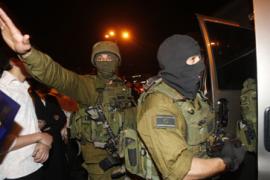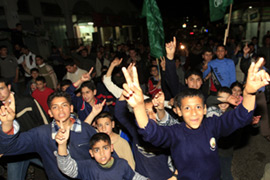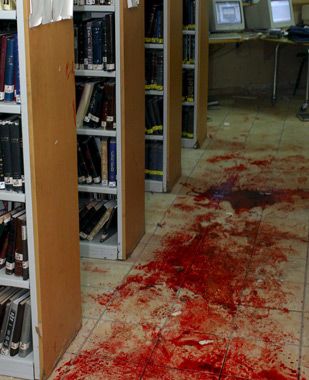But the UN Security Council failed to agree on a statement at a contentious emergency meeting.
Al Jazeera’s John Terrett, reporting from the UN, said up to four countries wanted to link the Gaza and Jerusalem violence and the meeting broke down when the American delegation left over that.
Dan Gillerman, Israel‘s ambassador to the UN, then told reporters outside that this is what you got when the security council was “infiltrated by terrorists”, saying that Libya should not be on the council.
“Most members [of the council] wanted to condemn [the attack] but Libya blocked it,” he said.
Ibrahim Dabbashi, Libya‘s envoy, hit back, saying his country did not need a certificate of good conduct from what he said was the Israeli terrorist regime.
The seminary, located in the Kyriat Moshe neighbourhood, is a well-known centre for Jewish studies linked to those leading the Jewish settler movement in the occupied West Bank.
 |
An Israeli solider and a student
shot the attacker [Reuters] |
Micky Rosenfeld, an Israeli police spokesman, said the attacker walked through the seminary’s main gate and entered the library.
He carried an assault rifle and pistol, and used both weapons in the attack, spraying dozens of bullets.
At least six empty bullet clips were found on the floor, Rosenfeld said.
Israeli defence officials said the attacker came from east Jerusalem, the predominantly Arab section of the city which Israel captured and occupied in the 1967 Middle East war.
In contrast to Palestinians in the West Bank, those in Jerusalem have Israeli identification cards, allowing them relatively free movement inside Israel.
‘Slaughterhouse’
Al Jazeera’s Ayman Mohyeldin, reporting from the scene of the attack, said that questions would be raised as to how the assailant passed through the many security checks situated in the area.
| “This heroic attack in Jerusalem is a normal response to the crimes of the occupier and its murder of civilians”
Sami Abu Zuhri, Hamas spokesman |
Yehuda Meshi Zahav, the head of the Zaka rescue service who entered the library after the attack, said “the whole building looked like a slaughterhouse”.
Witnesses said students jumped out the windows of the building to escape during the shooting.
One of the students, Yitzhak Dadon, said he shot the attacker twice in the head before a soldier killed the man with an automatic rifle.
“I laid on the roof of the study hall, cocked my gun and waited for him. He came out of the library spraying automatic fire,” he said.
The seminary serves some 400 high school students and young Israeli soldiers, many of whom carry arms.
Crowds react
After the shooting, hundreds of seminary students demonstrated outside the building, screaming for revenge and chanting against Ehud Olmert, Israel’s prime minister, as well as “Death to Arabs”.
The angry crowd turned on Al Jazeera’s crew and the team had to leave under escort by Israeli police. Other students prayed and huddled together and many were seen crying.
Al Jazeera’s Jacky Rowland said the shooting was a psychological blow to many Israelis as the area is a cultural and ideological centre of Jerusalem and people will definitely feel vulnerable that an attack took place in a deeply religious area.
 |
Gazans who have seen deadly Israeli raids for a
week, hailed the seminary shooting [AFP] |
In the streets of Gaza, thousands of Palestinians celebrated, with people firing into the air and sounding their horns.
An Israeli military onslaught in Gaza killed more than 120 Palestinians in the past week.
Rowland, reporting from Gaza, said Palestinians were elated and anxious at the same time, feeling that the attack would not go unpunished.
Mark Regev, Israel’s government spokesman, told The Associated Press that “tonight’s massacre in Jerusalem is a defining moment”.
“It is clear that those people celebrating this bloodshed have shown themselves to be not only the enemies of Israel but of all of humanity.”
Mahmoud Abbas, the Palestinian president, condemned the attack.
“President Mahmoud Abbas condemns the attack in Jerusalem that claimed the lives of many Israelis and he reiterated his condemnation of all attacks that target civilians, whether they are Palestinians or Israelis,” Saeb Erekat, an Abbas aide, said.
Talks to continue
But Regev said the Palestinians must go further and take steps against extremists.
The attack came a day after Condoleezza Rice, the US secretary of state, persuaded Abbas to return to negotiations with Israel.
Abbas had briefly suspended talks to protest against the Israeli military offensive in Gaza.
A spokesman for the Israeli foreign ministry said that those responsible for the shooting were “killing chances for peace” and vowed to “continue our fight against terrorists”.
But Arye Mekel said that Israel would carry on with the negotiations.
‘Normal response’
While not claiming responsibility for the attack, Sami Abu Zuhri, a spokesman for Hamas, said “this heroic attack in Jerusalem is a normal response to the crimes of the occupier and its murder of civilians”.
Taher al-Nunu, another spokesman, blamed the attack on Ehud Olmert, the Israeli prime minister, and Ehud Barak, the defence minister.
“We have warned before about the responsibility of the escalation in Gaza and warned of Palestinian anger,” he said.


